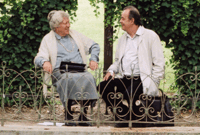Otar Iosseliani’s understated and reassuringly familiar abstract comedies are incisive, universal expositions on human absurdity, the complications of modern life, and the seasonality of fortune, so it is particularly satisfying to see the unremarkable (anti)hero of his latest film, Gardens of Autumn break through this corruptive and dysfunctional cycle of power, materialism, and social mobility to find some measure of happiness. The film’s opening sequence provides a wry and irreverent glimpse into Iosseliani’s acerbic satire on social behavior, as a handful of customers browse through a limited product selection at a coffin maker workshop, staking their claim on their preferred unfinished caskets in relative civility until several potential buyers begin competing for custody over a particular, one-size-fits-all “custom” model. The absurd juxtaposition of insatiable consumerism even in the face of mortality provides an insightful preface to the film’s subverted expectation, as possession and privilege become intertwined with the mundane reality of inevitable death. In Gardens in Autumn, the unlikely hero is Vincent (Séverin Blanchet), a sad-eyed, rumpled, middle-aged cabinet minister with an attractive, shopaholic mistress, a distracted, coddling mother (in the hilarious casting of Michel Piccoli in drag), a string of jilted lovers (and almost as many adopted, commemorative exotic animals), and a meaningless, time-wasting bureaucratic job. Once an influential political appointee with seemingly important ceremonial (albeit nebulous) responsibilities (an early episode of a goodwill diplomatic visit with an African dignitary over the hunting of wild game, and a subsequent ribbon-cutting duty on a farm inauguration suggest an agriculture and wildlife post), Vincent’s comfortable life is upended (even literally, as he resorts to standing on his head to in an attempt to regain his composure after the traumatic ordeal) when a widespread scandal and public protest leads to a change in the political winds, and with it, his forced resignation from office and ouster from the well-appointed, government furnished estate that he has called home for years. Returning to the shuttered family apartment in the working class neighborhood of his youth only to find his home overrun by squatters, Vincent soon finds refuge in the company of old friends (including a street artist played by Ioselliani) and former lovers as he settles into a carefree, bohemian life, drifting through a series of makeshift shelters alongside his eccentric – and often inebriated – companions and strange bedfellows. Iosseliani’s familiar aesthetic of medium shots, muted humor, near wordless scenarios, and endearing, representational characterizations proves especially suited to the film’s timeless, modern fable of a person’s fall from grace, transforming the humiliation of the vanquished into the humble victory of the everyday hero, reinvigorated and impassioned by the quotidian pleasures found in the often overlooked minutiae of quiet self-liberation.
© Acquarello 2006. All rights reserved.
